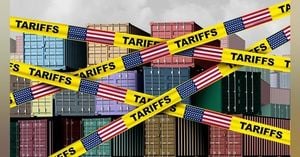Thailand's automotive parts industry is bracing for a challenging 2025, with projections indicating a contraction in the market driven by reduced vehicle production and exports. As one of the leading global manufacturing bases, Thailand produced over 1.8 million cars in 2023, ranking it tenth worldwide. This production relies heavily on a comprehensive supply chain, including essential raw materials like rubber and plastic, which are transformed into automotive components.
According to a report by the Kasikorn Research Center, projected sales for Original Equipment Manufacturer (OEM) parts in Thailand are set to shrink by approximately 2.9%, estimating total sales at less than 450 billion baht. This decline directly correlates to an anticipated decrease in domestic vehicle production, expected to fall below 1.3% to no more than 1.45 million units. The report highlights two primary causes: a sustained drop in domestic car sales amid high levels of consumer debt and stagnant purchasing power, and a contraction in automotive exports due to increasing global trade barriers and stiff competition from Chinese vehicles.
Despite the anticipated drop, Thai manufacturing is being urged to pivot toward Battery Electric Vehicle (BEV) production, with initiatives like the EV3.0 and 3.5 programs. However, experts caution that the number of BEVs produced might not exceed 30,000 units, and only a fraction—less than 40%—of Thai OEM components are suited for BEV production, thereby further diminishing demand for traditional automotive parts.
On the export side, the outlook remains moderately optimistic, with a slight projected increase of 0.5% in OEM parts sales reaching approximately 228 billion baht. While the total number of vehicles produced for export is anticipated to grow by 0.2% to around 11.46 million units, specific markets may see declining figures due to internal economic challenges. For instance, Indonesia’s middle-class contraction poses a significant threat to its automotive market, while Japan's exports may decrease in light of potential U.S. tariff increases, leading to diminished demand for Thai OEM products.
Meanwhile, the market for Replacement Equipment Manufacturer (REM) parts looks slightly more promising. In 2025, sales of REM parts in Thailand are forecasted to increase by about 2.3%, reaching an estimated 121 billion baht. This growth is largely attributed to the rising number of vehicles on the road, with an expected accumulation of 21.31 million registered cars in 2025. Notably, vehicles aged over seven years are projected to constitute 70% of registered cars, thus escalating demand for REM parts, which could account for over 60% of the market share. However, competition from Chinese imports is intensifying, with their share of the REM parts segment in ASEAN markets reportedly rising sharply.
Challenges Ahead: The Thai automotive parts industry is not without its struggles. Tensions in global trade, particularly after the administration of former U.S. President Donald Trump imposed tariffs that could dramatically reshape supply chains, underline the vulnerabilities facing manufacturers. Observers note that the transition to BEV technology may adversely affect demand for traditional automotive parts and that significant investment will be necessary to deter reliance on imported components, especially from China, which is expected to increasingly target similar markets as Thailand.
As Thai policymakers gear up for the upcoming transformation in the automotive landscape, collaboration between the government and private sector is deemed essential to navigate the complex environment effectively. The Minister of Commerce, Phichai Naripthaphan, has advocated for a comprehensive approach to bolster Thai exports and has set an ambitious target of 3.5% growth in 2025 to revitalize economic engines stifled by external pressures.
Currently, the Ministry projects a notable export growth rate of 13.8%, indicative of a rebound driven by increased investment and rising demand for electronics—another key sector. This positive momentum, according to Minister Naripthaphan, should also foster confidence in the manufacturing sector as it prepares for the dynamic shifts influenced by geopolitical factors.
As Thailand seeks to recover from the economic downturn triggered by the global pandemic and subsequent supply chain disruptions, a collaborative approach to manage risks, adapt strategies, and focus on innovation will be vital. The government remains vigilant and prepared to engage with private enterprises to ensure that Thailand’s automotive parts industry not only withstands current challenges but emerges resiliently on the international stage.
The automotive parts industry faces an uncertain road ahead, marked by competitive pressures and a necessary pivot towards sustainable vehicle options. However, with strategic management, investment in technology, and a focus on domestic capabilities, there is room for optimism amidst the challenges.






